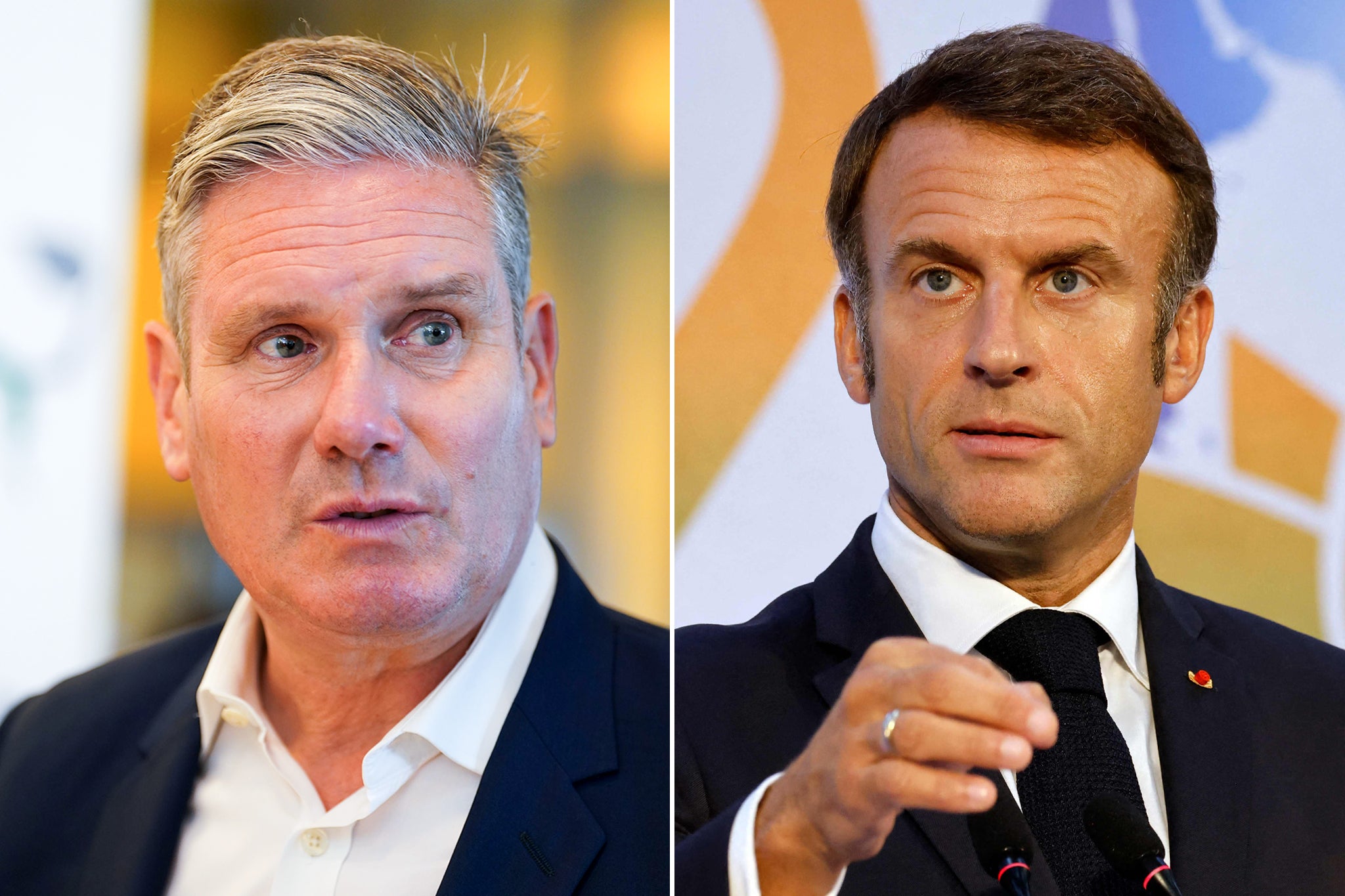Why is Keir Starmer meeting with Emmanuel Macron – and will it do his election prospects any good?
As the Labour leader prepares to hobnob with the French president, Sean O’Grady asks if this means next year’s election is already in the bag


In a move that has been widely, and appropriately, reported as a “coup”, Keir Starmer is to make his most high-profile appearance yet on the world stage when he attends a formal meeting with the president of the French Republic, Emmanuel Macron, next week.
Although heads of state and governments do sometimes meet with opposition politicians, the French are normally sticklers for protocol and status, and the rules are only rarely relaxed.
Macron was diplomatic enough to inform Rishi Sunak of the forthcoming meeting when the pair were in Delhi for the G20 last week. Given how much store Sunak places on warming relations with France and the EU, and his previous successful summit meeting with Macron last March, the news may have come as something of a disappointment.
There surely can’t be room for three centrist-inclined technocratic pragmatists in this bromance?
What’s in it for Macron?
The president is nothing if not a skilled reader of political trends (notwithstanding his own subdued popularity), and he clearly subscribes to the received wisdom that Starmer will be prime minister next year. Backing a winner probably appeals to Macron, and it will leave Starmer (slightly) in his debt. So it’s smart to make his acquaintance, establish a rapport, and see what France, and the president, can get out of it.
There’s plenty of scope, in fact, for win-win outcomes in areas such as migration, smoothing the still-rough edges of the Brexit deal, catching a few more fish for French trawlerfolk, and seeing the UK become a closer collaborator on defence and security matters. Since the invasion of Ukraine, European solidarity in the face of Russian aggression has moved from being an empire-building Eurocrat dream into a matter of vital national interest for every nation in Europe, inside and outside the EU or Nato.
What good will it do Starmer?
Obviously it helps him to look like a world statesman, and somewhat “prime ministerial”, if he is treated with the courtesies and ceremonials usually afforded to a head of state or a government minister. Tony Blair enjoyed some helpful coverage when he was opposition leader in 1996, thanks to US president Bill Clinton’s generous offer of time and photo opportunities. It all helps to make the phrase “Prime Minister Starmer” seem more natural, if not inevitable.
If Starmer is to become prime minister, he may as well get to know his counterparts. As a bit of a warm-up, Starmer will meet the Canadian prime minister, Justin Trudeau, and the German chancellor Olaf Scholz at an international centre-left conference in Montreal before jet-setting off to the Elysee.
There aren’t many direct votes in any of this – the price of petrol is of more interest to the British electorate than Starmer’s still-modest global profile – but it all helps to burnish an image of competence and maturity, along with hopes that Britain might no longer be laughed at internationally. After all, Boris Johnson’s statesmanship over Ukraine was undermined by his boorish ways with our closest neighbours in Europe; and Liz Truss’s silly remark about it “remaining to be seen” whether Macron was a “friend or foe” still makes one wince.
What could go wrong?
The press. Always on the lookout for pomposity to prick, and, with the majority of the media institutionally hostile to Labour, the slightest snub, real or perceived, in either direction will be seized upon as a Starmer blunder and the worst humbling of Britain (England) by France since the Hundred Years war.
Starmer’s willingness to engage with France to mutual advantage is already being portrayed as a sort of treachery. Suella Braverman, never known to hold back, dismissed the Starmer-Macron sort-of-summit and tentative migration deal with her characteristic elan: “Finally we see Sir Keir Starmer’s migration plan. He’ll let Brussels decide who comes to the UK. He’ll agree to make Britain the dumping ground for many of the millions of illegal migrants that Europe doesn’t want. And none of this will stop the boats.”
Neither are such foreign liaisons guaranteed to make Starmer PM. As one Conservative spin doctor points out, in 2012, the then opposition leader, Ed Miliband, met France’s then president, Francois Hollande. Both men went on to lose subsequent elections.
It’s not always a boost, then?
No. Back in 1984, at the height of the Cold War, the then Labour leader Neil Kinnock scored something of a triumph by being the only world “leader” to meet both the US president, Ronald Reagan, and the Soviet leader Konstantin Chernenko that year. Neither visit went especially well. In Washington, Reagan was his usual charming self and listened politely to Kinnock as he explained why the concept of nuclear deterrence was outdated.
But Reagan mistook former defence secretary and Labour foreign affairs spokesperson Denis Healey for the British ambassador; and no one had any doubt about Reagan’s admiration for Margaret Thatcher. When the group later made it to the Kremlin, it was the Labour leader’s turn to be humiliated when the old and ailing Chernenko was heard whispering to an aide: “Who is this Kinnock?”
At least Macron won’t do that to Starmer.






Join our commenting forum
Join thought-provoking conversations, follow other Independent readers and see their replies
Comments